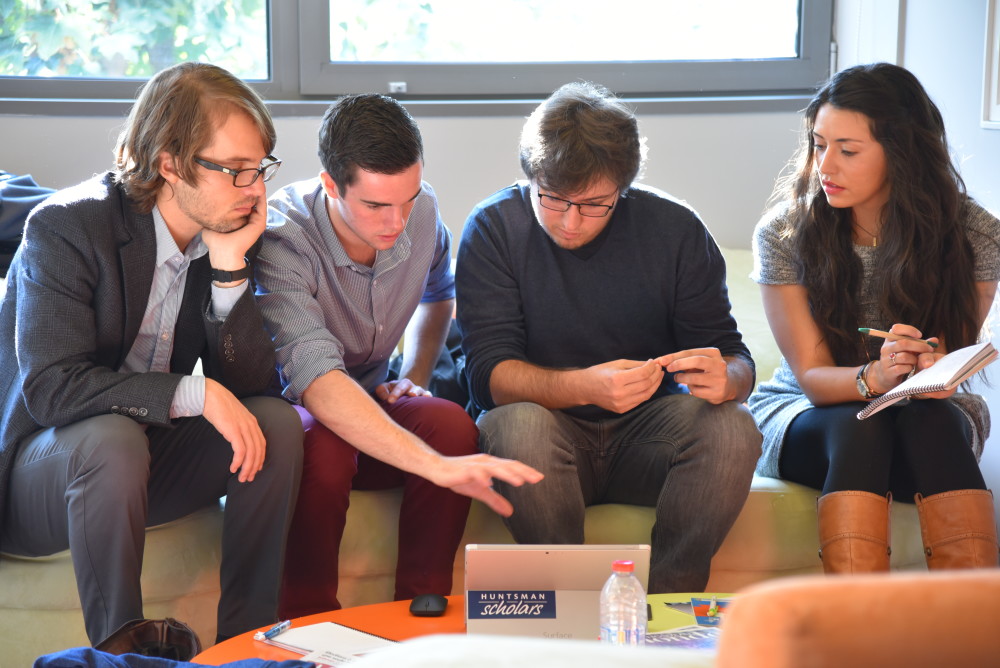“There is no one Huntsman scholar” : Huntsman scholars gain global business vision in recent trip to Europe
During the month of October, twenty-three junior students and two professors of the Huntsman scholars program at Utah State University traveled to six different countries in Europe to practice leadership techniques with international businesses and experience new cultures.
The group of scholars traveled to England, Scotland, Belgium, Switzerland, Germany and France where they visited governmental organizations and businesses, met with entrepreneurs and toured historical landmarks.
John Ferguson, associate director of the Huntsman scholars program, said that a main part of the trip was to expose the students to a variety of different global approaches and uses in business.
“Business skill sets can be applied to do all sorts of things. It doesn’t just have to be working in a cubicle somewhere”, said Ferguson.
During their time spent in Europe the scholars were expected to work on five to six different projects, many of which included collecting data for demographic research, debating the immigration crisis and figuring out how to introduce American products to a European market.
Emilee Fielding, a Huntsman scholar studying accounting, said that a lot of the projects allowed the scholars to sit down with startups and talk with them about the things that were going well within their business and the things that could use improvement.
“This is what I love about Huntsman scholars. Rather than hearing a lecture about doing business in France in a classroom, we had the opportunity to converse with real entrepreneurs in France and discuss real business issues”, said Fielding.

Photo courtesy of Professor Furgeson
Not only did the trip allow the students to execute legitimate marketing strategies with businesses and negotiate with successful entrepreneurs, but it also placed them in a scene that fostered different levels of cultural exposure.
Several of the scholars’ assignments required them to interview the local people on their views of hot-button political economic issues like inequality, healthcare and immigration.
Fielding said these interviews oftentimes led to interesting conversations.
“My experience in Europe would not have been the same if I hadn’t gone out and talked to the local people”, said Fielding, “the trip and the interviews I had with people helped me understand our cultural differences in a new way”.
Michael Scott Peters, another Huntsman scholar studying engineering and finance, said that getting that cultural exposure was just as important as the business aspect of the trip.
“The French think very differently from the Americans and the Germans have a whole different view from us as well, so it was cool to see how the different cultures interacted” he said.
The close interactions between the scholars and the local people, paired with the business endeavors, taught the students to appreciate even the simplest of cultural differences.
Peters said that everything from the Belgian waffles to the French crepes to tasting escargot for the first time was a different and valuable experience.
“It felt good to get out of my comfort zone and really immerse myself in the culture and I think all of the students came away feeling a little more European than we had in the past 4 weeks” he said.
Upon arrival back into the United States, the Huntsman scholars would apply their experiences and learning to group projects and presentations where they were and still are expected to work together as a team, despite their different opinions and leadership styles.
Shannon Peterson, director of the Huntsman scholars program, said her and Professor Ferguson both delegate a lot of responsibility to the students to practice leadership because they believe there is no better way to learn leadership than to actually do it.
“Dr. Shannon Peterson and Professor John Ferguson are two amazing faculty members that have pushed me to challenge my assumptions, think critically and be open to seeing the world in new ways” said Fielding.
Peterson and Ferguson also both fittingly pressure the students to learn to appreciate the differences amongst one another, cope with those differences and still be able to deliver high quality projects.
“Developing empathy and understanding for other people is one thing that has to be developed during the semester because if not they will isolate themselves” said Peterson.
Peters said that his assumptions had really been challenged this semester because of the variety of different business majors, backgrounds and personalities.
“One thing that they tell you is that there is no one Huntsman scholar, there is no specific person that they look for, but every year they look for what will make the best group”, he said.
Often referred to as “the family”, the scholars, professors and students alike, both created an intense and prized connection with one another as a result of their trip to Europe.
“You don’t have a lot of opportunities to see and help students grow and realize things about themselves that they didn’t know before,” said Ferguson, “that moment of self-actualization and being a part of that process with students is transformative for the students and so it’s transformative for us as well”.
Dr. Peterson, having been a part of the program for nine years, and Professor Ferguson, having been a part of the program for four years, both agree that every trip is different because the students are always different.
Peterson said that overall the trip to Europe, apart from the whole program, is specifically meant to help the students come to their own understanding of how the world works.
“The significance of this trip is that it helps the students recognize that there are a lot of ways that you can make a difference in the world that you hadn’t really thought about before” she said “and now we honestly know these students on a personal and academic level, probably better than they know themselves” she said.
isabel.forinash@aggiemail.usu.edu
@imforinash

